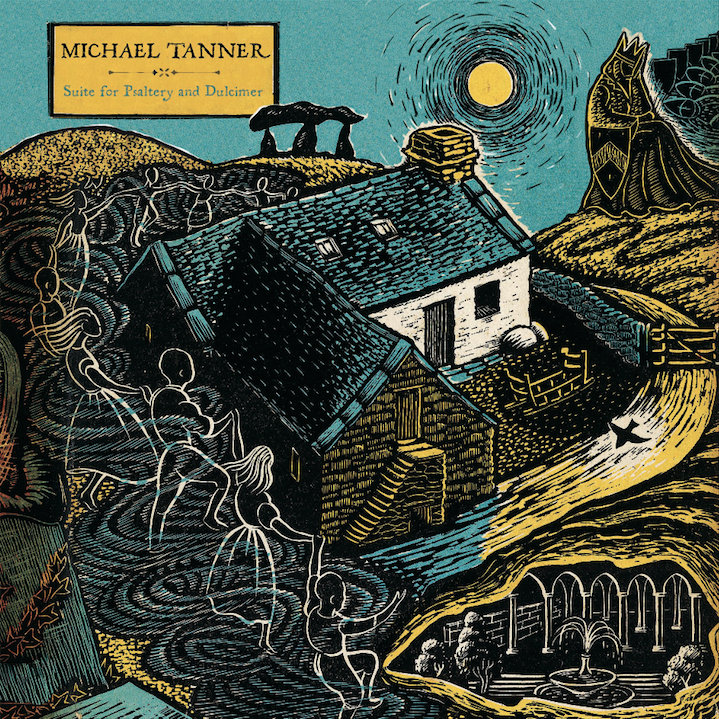Our collective relationship with nature and the past were at one time much more closely tied than they are now. Memories and tales were married to geography, word of mouth, and the distance one could travel by foot to tell and be told. However, while the gap gets closed by the digitisation of the indoor world, the outside world of the English countryside remains much the same. Grey and damp; imbued with the scent of decaying bark and cow pats, and dotted with steam train and spice museums. Recently, the likes of Ben Wheatley’s Sightseers or Will Sharpe’s black comedy series for Channel 4 Flowers, both vividly evoked the distinct visual nature of the English pastoral scene — equal parts grim and beautiful, the damp practically emanating from the screen.
The latest release from Kit Records by Michael Tanner is a stunning instrumental evocation of the same spirit, mired in the ancient wood and damp grass, haunted by memories. The likes of Richard Skelton have applied similar durational and instrumental techniques to impressionistic musical British landscapes, sketched utilising multiple cellos, violins, and guitars, but Michael Tanner focuses almost entirely on the two instruments namechecked in the album’s title, Suite for Psaltery and Dulcimer.
Under his own name and as Plinth, Tanner’s taken cues from a few different sources in the past when shaping out music of the Sussex landscape. The bounty of waging, new age cassettes, originally designed as bliss out music for hippies, and now the sonic food of choice for many a blog, is one such key inspiration. Tanner’s Witch Elder tape out on Reckno records in 2012 used only a ‘Broken Casio PT-30’ to create drifting synthscapes that rolled on and on like the scattered greens of Sussex meeting the South Downs at the sea; akin to Popol Vuh’s Aguirre were Klaus Kinski exploring the chalky British coastline rather than the Amazonian heart of darkness. Witch Elder saw Tanner assisted by sporadic bouzouki notes from Paul Condon of United Bible Studies, the loosely knit experimental folk collective based out of Ireland (Tanner is also an on/off member), and violist Alison Cotton and percussionist Matthew Shaw compliment Tanner similarly on Suite for Psaltery and Dulcimer. For the most part though, it’s a powerfully beautiful exploration of both the plucked, harp-like psaltery and effects-laden bowed dulcimer that, far from leaping into a cosmic wormhole like Laraaji, stays closely tied to the the lady Gaia.
The first side contains one single 21-minute piece based around the lethargically plucked psaltery by Tanner. Kit Records notably mention how the pieces aren’t really ‘songs’ or ‘pieces’ at all, and that they’ve been likened to ‘little spells’. Throughout the duration of ‘Psaltery’ an ethereal environment is conjured before us, evolving through various shades and tones, even volumes. The opening minutes have strings plucked through a sketched semblance of melodies and chords in a forlorn mode, drifting without rhythm surrounded by plentiful vacant space. The entrance of Alison Cotton’s viola ushers in a flurry of psaltery notes rushing like a stream, and the centre of the piece exchanges overflowing sadness with a sort of latent bliss, both Tanner and Cotton’s strings jangling like wind chimes. They slowly dissolve for the final third of the ‘spell’, and when they’ve disappeared it is very much as if waking from a dream.
‘Dulcimer I’ and ‘Dulcimer II’ date back originally to a CD-R put out under Michael Tanner’s Plinth nom de plume in 2009, and see bowed melodies arising and interleaving from a dulcimer. The full original release also featured contributions from Richard Skelton and Aine O’Dwyer, but the remastered tracks here include only marginal atmospheric interjections from percussionist Matthew Shaw, tinkling away bell-like tones deep in the background on ‘Dulcimer I’. The intermingling bowed notes from the dulcimer crisscross constantly throughout the pair of ten-minute long pieces, to the point where the boundary lines of each sound disappear. The entire experience becomes one gradually ebbing fog of ancient string drones.
Like the landscapes and dotted villages that inspired it, this music is an emotionally complex creature trapped in time, and somewhere in between nature and artifice. Painting in such broad musical strokes is never going portray precise images or specific narratives, but the feelings that increasingly wash over you while listening to Suite for Psaltery and Dulcimer are definitely searingly potent. The physical world dissolves as we’re lulled into a dreamworld – and when it disappears, it’s hard to let it go.


